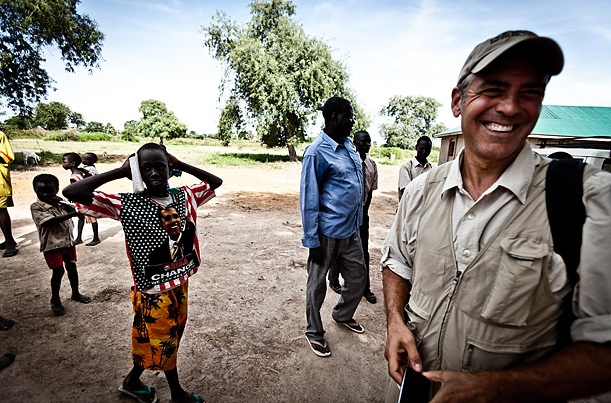
George Clooney is used to being the center of attention both onscreen and off. But he has been playing some particularly relevant roles of late—both in the real world and on screen.
In Hollywood he is making a splash with the newest political thriller, “The Ides of March,” which screened at a Satellite Sentinel Project benefit event last night at the Geffen Playhouse in Los Angeles and opens in theaters on October 7. Playing a presidential hopeful in a film released as the U.S. election season is heating up, Clooney’s “Governor Mike Morris” will no doubt resonate with audiences. But his work with the Satellite Sentinel Project is generating ample real-life significance as it spotlights human rights abuses in Sudan.
Clooney’s performance in “The Ides of March” has prompted questions about his political ambitions. But when asked if he would ever consider running for office, Clooney told the Los Angeles Times, "I don't wake up in the morning and say, 'I wish I had President Obama's job.'" Clooney elaborated:
I'm not getting in politics. I have no interest in politics — because of the compromises you have to make. I don't have to make those kind of compromises when I get to go to the Sudan or Darfur. I get to come back and sit down in front of the Security Council at the United Nations and say, 'This is right, and this is wrong. Now how you deal with it, I don't know, but this is right and this is wrong.'
This uncompromising dedication is apparent in Clooney’s work in Sudan. With five other celebrities he founded Not On Our Watch, a group committed to “robust international advocacy and humanitarian assistance.” And in 2010 after a trip to Sudan with Enough Project Co-Founder John Prendergast, Clooney launched the Satellite Sentinel Project to cast a spotlight on atrocities against civilians being committed in in real-time.
On Sunday, Parade magazine, which is distributed in over 500 of the country’s biggest newspapers, highlighted Clooney’s humanitarian work. In his interview with David Gergen, Clooney talked about his four trips to the Sudan, saying, “Two million people were killed in the north-south war in Sudan before 2005. I wasn’t going to stand on the sidelines and not participate.”
SSP is a collaboration between The Enough Project, Harvard Humanitarian Initiative, or HHI, DigitalGlobe, and Trellon. HHI analyzes the imagery obtained by “Clooney’s satellites” — actually the keen, clear eyes of DigitalGlobe's constellation of three satellites — and writes reports, which the Enough Project then uses to advocate for policy recommendations. In less than a year, the SSP has reported on attacks in Abyei, evidence of mass graves in South Kordofan, and troop build-ups in Blue Nile.
Clooney’s participation is the driving force behind the Satellite Sentinel Project. In his interview with Parade, Clooney explained, “I set up this satellite system on the border of Abyei, and we’ve had incredible success in photographing mass atrocities. The idea is, we’re just going to keep the pressure on. Turning the lights on doesn’t mean anything stops. But it makes it harder, and that’s our job.”
Photo: Actor and activist George Clooney in South Sudan, in an image that ran in Parade (Enough/Tim Freccia)

